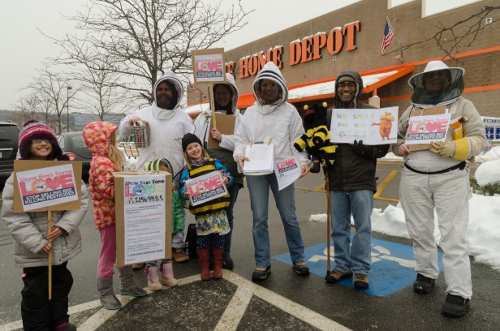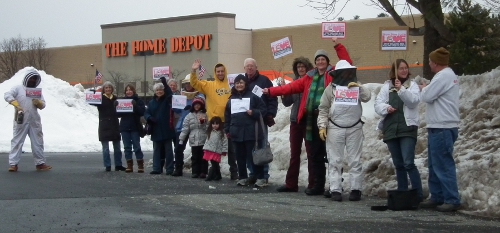Beekeepers request that Home Depot and Lowe’s stop selling bee-killing pesticides and plants
On February 15, beekeepers and friends of bees (and food) delivered over one hundred signatures to the managers of the Home Depots in Natick and Waltham and of the Lowe’s in Framingham, asking that the stores“Show Bees Some Love” by removing bee-killing pesticides and plants from their shelves.
These friendly protests were part of the Bee Week of Action taking place all over the US, with over 27,000 people delivering more than half a million petition signatures to Home Depot and Lowe’s. It was organized by Friends of the Earth (www.foe.org) with many partners, the most local of which was the BEElieve beekeepers group, based in Wayland.
Bees and other pollinators are essential for two-thirds of the food crops humans eat every day. But their populations are dwindling worldwide. Last year U.S. beekeepers reported losses of 40-100 percent of their hives. “Backyard beekeepers lose more than half of our hives every year,” said Kaat Vander Straeten, a Wayland beekeeper. “When now I advise people thinking about bees, I tell them to start with at least two hives, preferably three.”
The gardeners and farmers too are hurting from the bee die-off. “I have been a vegetable gardener for the past 4 years,” says Kenneth Weiss of Framingham. “I have had to resorted to hand-pollinating plants that bees usually pollinate, which is laborious. I can’t imagine what this does on larger scale farms.”
A growing body of science has implicated neonicotinoids (“neonics”) – the most widely used class of insecticides in the world — as a key factor in global bee deaths. The European Union’s two-year ban on the most widely used neonics went into effect in December. In January, the European Food Safety Authority cited evidence that two neonicotinoids (acetamiprid and imadacloprid) may affect the developing human nervous system of children, and they recommended further restricting their use.
But in the States, the EPA has delayed action on neonicotinoid pesticides until 2018. The shelves of the largest retailers, Home Depot and Lowe’s, are lined with these pesticides. Moreover, a study released last summer (Gardeners Beware) found that even so-called “bee-friendly” garden plants sold at the stores are pretreated with them, without warning to customers.
“It was astonishing for me to learn,” said Janet Drake of Framingham, “that I was unknowingly contaminating my garden by bringing in new plants whose foliage or systems already have in them the very chemicals I thought I was avoiding!”
“Bee killing pesticides have been banned in Europe and the UK’s top garden retailers have voluntarily stopped selling them,” said Barbara Belote of Wayland. “Here big corporate profits still count more than our food supply.”
But Home Depot, at least, seems to be listening.
“We learned just today,” said Katharina Wilkins, a Weston beekeeper, “that Home Depot has been working on alternatives and that several of its suppliers are already using replacements, and also that they are talking with Friends of the Earth. So our visit here is meant as a thank-you for that, and an encouragement.”
To date, Lowe’s has not made any public statements or responded to meeting requests by Friends of the Earth.
Asked if their action is hurting business, Wilkins said that it is not intended to. “This is not a call for a boycott, it is an invitation for collaboration and dialogue. It actually seems to me that Home Depot and Lowe’s have a fantastic opportunity to respond to their customers who are taking more and more interest in sustainability and pollinator protection.”
“Concerned customers can keep demanding of nurseries and garden centers to stop selling these pesticides and to offer third-party certified organic starts and plants,” said Vander Straeten. More information about neonics and which names they go under can be found at www.beyondpesticides.org/pollinators/chemicals.php.


